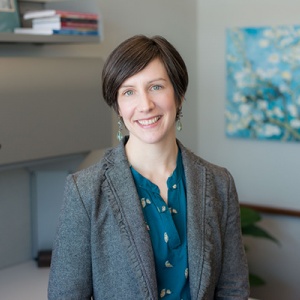
Growing up in rural Midwestern communities helped inspire Lori Ihrig’s commitment to helping other rural students succeed.
Ihrig, supervisor for curriculum and instruction at the University of Iowa Belin-Blank Center for Gifted Education and Talent Development in the College of Education, uses her background in science education to advance academic study in STEM in rural communities.
Though Ihrig graduated from Osage High School in Osage, Iowa, she considers Iowa City her hometown since she has lived here for 26 years.
In her Belin-Blank Center role, Ihrig serves as project director for the STEM Excellence and Leadership program, which aims to enrich the lives of talented and gifted Iowa students in rural communities.
“The STEM Excellence and Leadership program is a way for us to ensure that rural high-ability students have access to high-quality opportunities for advanced academic study in STEM,” Ihrig says.
The program involves more than 30 educators and 10 rural school districts across Iowa including Adel-Desoto-Minburn, Atlantic, Cardinal, Davis County, Eddyville-Blakesburg-Fremont, Fort Dodge, Graettinger-Terril, Mount Pleasant, Spencer, and Starmont. More than 500 students have benefitted from the above-level testing the program offers, and more than 200 students have also participated in its extracurricular STEM programming.
In the long term, the program aims to decrease barriers and create opportunities to support high-achieving rural students’ accomplishments, aspirations, and preparation. This will ensure they are situated to navigate effectively the educational pathways necessary for STEM academic and career success at the highest levels, Ihrig says.
In recognition of her work advancing innovative K-12 education, Ihrig earned one of the Yager Educational Accomplishment Award in 2016. The annual award is one of the most prestigious honors the college presents to a graduate.
To this day, Ihrig remains steadfast in her enthusiasm for helping students and developing ways to see them reach their highest potential.
“From growing up and teaching in rural communities I know first-hand that rural communities have differential access to academic opportunities,” she says. “I am fortunate enough to be able to work toward greater equality through the work I engage in.”
